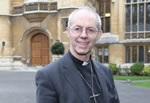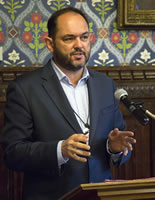Archbishop Backs Roehampton Academic’s Work
To improve relations between religious groups & local government planning system
The Archbishop of Canterbury has given his backing to recommendations created by a University of Roehampton academic, to improve relations between religious groups and the local government planning system.
A series of 15 recommendations have been drawn up by Dr Andrew Rogers from Roehampton’s Department of Humanities, together with Dr Richard Gale from Cardiff University, as a result of a year’s research through the Faith and Place Network. They were launched at the House of Commons on Thursday 15 October to an audience of religious leaders and senior figures from the planning sector.
 The Archbishop of Canterbury, the Most Reverend Justin Welby said: “I welcome this report from the Faith and Place Network, which highlights the challenges faced by a diverse and growing number of faith communities seeking places for worship. These challenges are particularly acute for migrant faith communities, for whom worshipping in their own tradition both supports community life and affirms identity. We must heed the strong biblical imperative for us to welcome the stranger and to treat them and love them like ourselves.”
The Archbishop of Canterbury, the Most Reverend Justin Welby said: “I welcome this report from the Faith and Place Network, which highlights the challenges faced by a diverse and growing number of faith communities seeking places for worship. These challenges are particularly acute for migrant faith communities, for whom worshipping in their own tradition both supports community life and affirms identity. We must heed the strong biblical imperative for us to welcome the stranger and to treat them and love them like ourselves.”
Among the 15 recommendations in the Faith and Place Network’s full report were:
• Faith groups should take a more active involvement in the development of council Local Plans to ensure their views are included in the consultation process.
• Councils should review data on planning applications to ascertain whether refusals are above average from faith groups and take appropriate action if required.
• Councils should prioritise protecting space for social infrastructure, including places of worship.
• Greater use of ‘section 106’ funding identified in the Town and Country Planning Act from developers for creation of buildings suitable for use as places of worship.
The Archbishop continued: “I am pleased that the Faith and Place Network is advocating better understanding across those groups for whom this is a key issue: on the part of local authorities of the practices and needs of faith communities; within faith communities about the planning system; and, crucially, between faith communities. Understanding one another is essential in building the trust and confidence in which these challenges can be addressed.”
He commended the work which the network had carried out both to faith communities and to council planners and encourage them to engage seriously with the recommendations.

Dr Rogers, pictured left, said:
“There are challenges in our briefing for both faith groups and for the planning sector. Ultimately both sides need a greater understanding of each other if the growing religious communities in our cities are to thrive and be able to worship with dignity.
“We have evidence of churches and other faith groups resorting to industrial estates and retail parks to establish a place of worship. Clearly this isn’t ideal for them, and it rarely accords with the wishes of councillors who want to encourage business growth.”
Support for the project has also been received from Brandon Lewis MP, Minister for Housing and Planning in the Department for Communities and Local Government, who said:
“I warmly welcome your policy briefing and I am glad that a multi-faith body is thinking about the wider picture for planning in our communities. In particular, I endorse the recommendation for more dialogue between local planning authorities and faith groups, so that different needs and ways of using buildings in different faith groups can be understood and planned for; and also the possibility of making helpful case-studies available to local planners.
“Local authorities too could do more to encourage members of faith congregations to get involved in planning, whether by contributing when a Local Plan is updated or by engaging in neighbourhood planning.”
The Faith and Place Network comprised 51 members including council planning directors, representatives of the Royal Town Planning Institute, developers and consultants, as well as senior church leaders, ministers, representatives of the Church Commissioners and academics.
At the House of Commons launch as well as unveiling the recommendations, Dr Rogers and Dr Gale set the project in context and explained the growth of new churches and the pressure this has placed on the planning process.
The network’s activities have been funded by the Arts and Humanities Research Council.
October 19, 2015
Related links
|